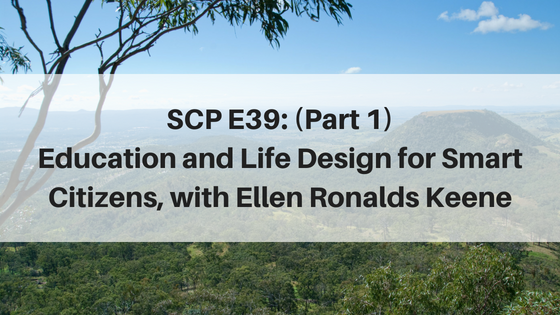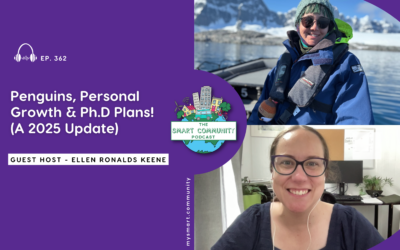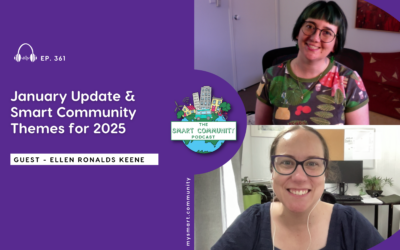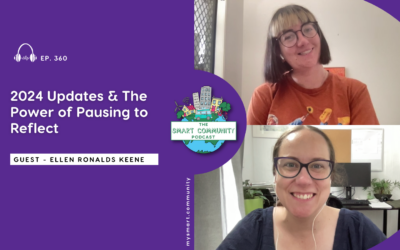In this episode of the Smart City Podcast, I interviewed teacher turned entrepreneur, Ellen Ronalds Keene. Ellen is passionate about education, health and wellbeing, and podcasts, and we had so much to talk about. This episode is split into two parts, so you’ll be able to hear the rest of our conversation in Episode 40. In Part 1 we talk about what Ellen has learnt about the Smart City concept, and why she thinks it’s important, as well as how she herself is embracing the Smart City concept from non built environment, planning or engineering background. She’s coming at Smart Cities from a different angle, so I hope you enjoy listening to this episode as much as I enjoyed making it.
Listen Here:
What we cover in this episode:
- Ellen’s background in education and her passion for health and wellbeing
- What sparked her interest in the Smart City space and what she’s learned from the Smart City Podcast
- The projects she’s working on now, including Self-Care for Teachers
- How Ellen uses data in her professional and personal life to improve health and wellbeing
- How we can learn from the gig economy and why it’s working for Ellen right now
- The pros and cons of being a freelancer and why not everybody should work for themselves
- The link between schools moving away from ‘one-size-fits-all’ approaches and the Millennial desire for flexibility at work
- The opportunities and difficulties in creating a high trust, high respect environment that allows for flexibility and individuality at work
- The challenges of educating Smart citizens in Australia, in schools, in workplaces and in homes
- The need to be intentional and proactive about creating the future that we want
Quotes:
“You can’t purchase health later in life, you need to really look after it all the way through.”
“It’s about using tech and data and all the other “Smart” options, but really it’s about human beings. It’s about society and community and making life better.”
“I think it’s important because hopefully it’s the way that we as humans can go to the next level, improve the lives of the top 1%, but also the rest of the world, and not ruin the environment in the process, and not spend all our lives chained to a desk in the process. Hopefully, improve the lives of all the creatures on the planet and the planet as well.”
“Data is absolutely a part of education, although getting stuck in data for data’s sake is a big concern for a lot of teachers.”
“Now that I’ve adjusted to it, I quite enjoy the gig economy, and the freedom that being a freelancer has given me. The freedom to run my day and look after my health and wellbeing in a way that works for me instead of against me.”
“[Millennials] were given a tailored approach [at school], and then we get out into the workforce and it’s still that industrialised model of conformity; everybody must do the same thing, even if it’s inefficient for everybody to do the same thing. And it’s wasting time and money and energy for everybody to be doing the same thing, because everybody doesn’t work in the same way.”
“In the previous episode you were talking about citizens, consumers having control of their data. I don’t really think Australians are there yet with that conversation at all. There’s a level of maybe our government and our industry isn’t driving it but I also think that Australian citizens are a bit oblivious to the Smart City concept.
“Before I was involved in this project I considered myself reasonably aware, and I still didn’t really understand it. I had heard the term [Smart Cities] but in my mind it was The Jetsons.”
“If we can’t even fairly fund all our public schools, you’ve got Buckleys of getting ageing teachers, burning out teachers to teach something like coding, which they don’t know themselves, and entrepreneurship which is a whole new world from the world that most educators live in. There’s a long way to go for us to be creating those Smart Citizens….The education of the adults, let alone the kids who are going to be tomorrow’s leaders, is so important.”
“We have to be intentional about creating the future that we want, otherwise that science fiction dystopian future that we’ve all been taught to fear by our entertainment, is more likely to happen.”
Links and Resources:
- Ellen’s work with Self-Care for Teachers and the Teacher Wellbeing Podcast
- Colin Wright’s Episode 17 of The Smart City Podcast
Connect:
Connect with Ellen via email: ellen@ellenronaldskeene.com or ellen@selfcareforteachers.com.au or via Facebook @ellenronaldskeene or @selfcareforteachers. She’s also on Twitter and LinkedIn, but not very active on either platform!
Connect with me via email: hello@mysmart.community
Connect with My Smart Community via LinkedIn or Twitter and watch on YouTube
Podcast Production by Perk Digital






0 Comments